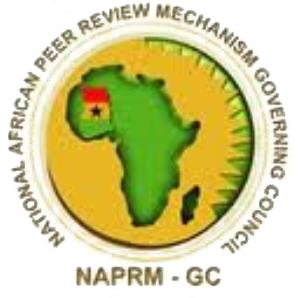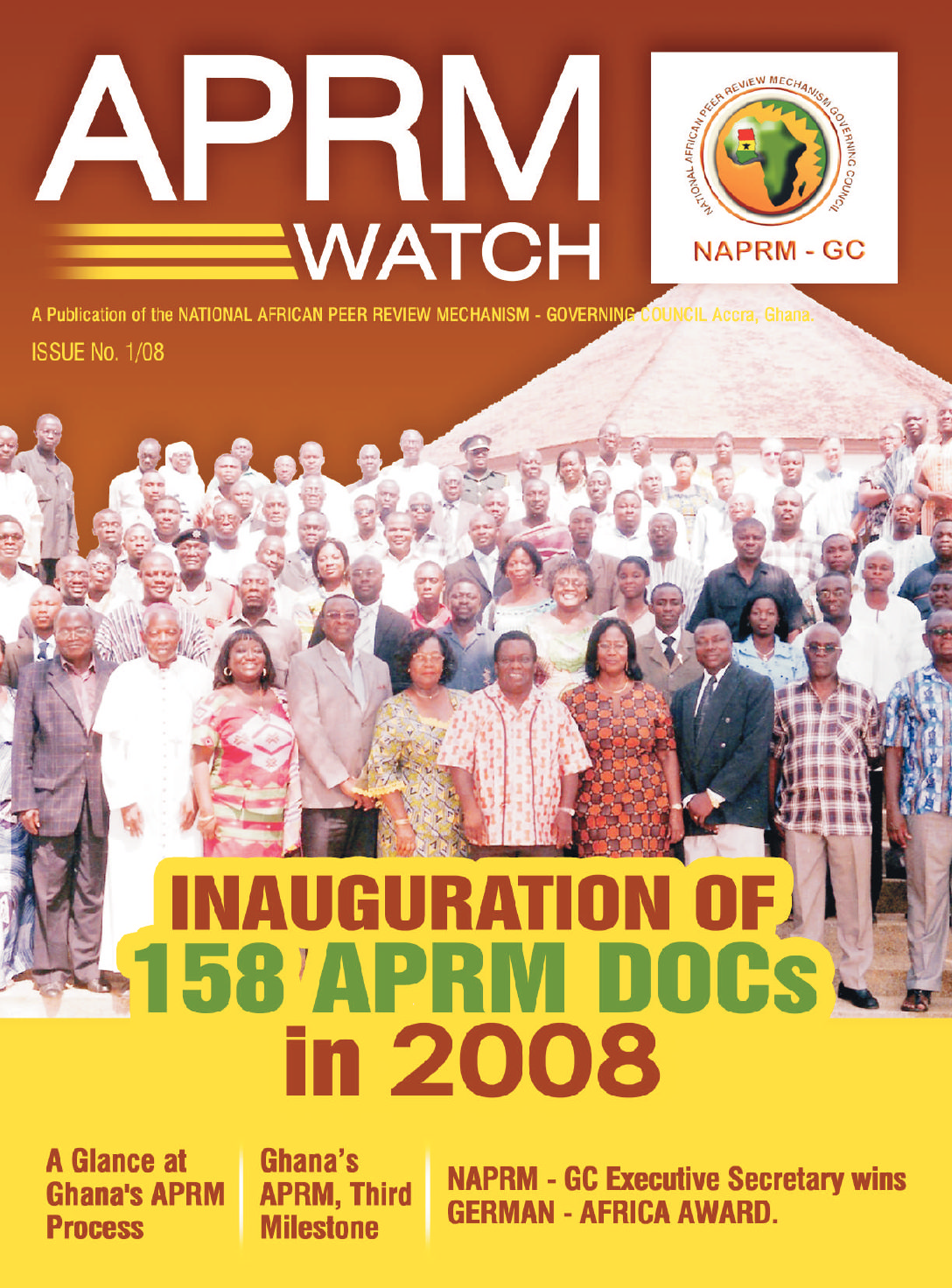By Kofi Akodor
When President J.A. Kufour presented Ghana as the first African country to open itself up for scrutiny under the African Peer Review Mechanism (APRM), many were those who thought the chief consideration for that decision was only to score political points back home and to create for himself, an image of dependency in the eyes of the international community.
Such people may not be wrong after all, because as an astute politician, the President could not have thought differently in taking such a decision.
The President could not, however, even as his eyes were fixed on the political gains, have been oblivious of the enormous challenges that the APRM posed on the democratic credentials of Ghana.
After the initial process of the review, the real challenge for Ghana began with the implementation of the Programme of Action (POA) in the four thematic areas of the review, namely democracy and good political governance; economic governance and management; corporate governance; and socio-economic development.
As part of the review process, countries which subscribe to. the APRM are required, under the APRM Reporting Standard, to submit progress reports on the implementation of the POA every six months to the APRM Panel, which is the highest authority, comprising African Heads of State.
Already, Ghana has cleared two hurdles of that commitment. The third report which covered January- June 2007 has just been released by the National APRM Governing Council (NAPRM-GC), which is coordinating the national review process.
According to the NAPRM-GC, “the objective of the report is to provide information on the progress made by stakeholders, including government and CSOs in implementing the national programme of action”.
The open participatory methodology was adopted by the NAPRM-GC in its information gathering to reflect its all- inclusive principle. There were three main approaches adopted for the collection of data. The first was to ask ministries, departments and agencies (MDAs) to provide information on such specific issues raised in the NPOA for them to address as areas of progress, areas of less progress, challenges and complaints in the implementation and the way forward.
In the second approach, questionnaires were administered to 1,380 respondents in all the 138 districts, while the third approach involved the conduct of focus group discussions and expert group workshops for targeted organizations involved in gender, governance, private sector and local governance issues.
At the end of the information gathering, a validation workshop was organized in June to enable the stakeholders critique the third draft progress report. Findings Under the first thematic area of democracy and good governance, the report observes that although the Ministry of Foreign Affairs, Regional Integration and NEPAD is yet to set up a ratification desk, there are strong indications that the Amendment to the Constitutive Act of the African Union (AU) and Non-Aggression and Common Defense Pact will be ratified before the AU Summit in July 2007.
It also indicates that the Lands Commission has decentralized its office in all the 10 regional capitals, and has also reduced the period of registration of lands and title deeds from 36 months to nine months. Furthermore, Parliament has passed a Bill on Small Arms, while the government was expected to present its position paper on Arms Trade Treaty (ATT) to the United Nations (UN) before the June 20, 2007 deadline.
On the promotion of constitutional democracy, political competition and the rule of law, the report expresses the hope that the Electoral Commission (EC) would continue its registration exercise in 2007, while the National Identification Systems (NIS) begins registration of
citizens of 18 years and above.
It, however, points out that “there is no indication in the new Decentralization Policy with regard to government’s position on the election of district chief executives (DCEs)”.
The performance of the nation as regards the promotion and protection of civil, political, economic and cultural rights was mixed.
On the brighter side, the report notes that three new districts were inaugurated within the period, in line with efforts to improve access to justice. Ten magistrates/circuit courts have also been refurbished and automated. The improvement in access to justice was confirmed by 46 percent of the respondents, while 40 percent of them thought otherwise.
It further mentions the passage of the Criminal Code Amendment Act, the appointment of a first female Chief Justice, as some of the steps taken in promoting the interest of women.
The report, however, points out some lapses as far as the promotion and protection of civil, political, economic and social rights are concerned. First, it observes that there is no policy yet on the option of integrating traditional arbitration into the Justice delivery system. Although a comprehensive programme of mainstreaming alternative dispute resolution (ADR) into the adjudication of justice has been completed.
It also notes that the Commission on Human Rights and Administrative Justice (CHRAJ) has not been given the mandate to prosecute cases and have to refer such case to the Attorney-General.
On the issue of ensuring accountable and efficient public and civil services, client service units have been set up in the ministries and key agencies to facilitate improved client service delivery. However, in the opinion of 54 percent of the respondents, public service holders are not accountable to clients.
“Institution space exists for citizens participating in national dialogue, but it is not clear how they feed into the policy making process. There is little engagement of political parties in policy formulation processes so as to ensure consensus on policy issues”, the report points out.
Fighting corruption, particularly in the public sector, is a cardinal demand in the NPOA. Ghana is not doing any better in the fight against corruption as it dropped 0.2 points in the 2006 Corruption Perception Index (CPI) published by Transparency International. According to the NAPRM-GC report, 44 percent of Ghanaians think there has not been any improvement in the fight against corruption.
Some of the measures being adopted by the government to deal with the phenomenon include the enactment of the Public Procurement Act (Act 663) and a Public Sector Strategy to inject corporate governance principle into the public sector. According to the report, the country’s procurement system is 70 percent compliant with international procurement standards, adding that other regulations and guidelines that are expected to give full backing to the Act are still before Parliament.
It, however, observes that, “there is no synergy between the institutions fighting corruption. Government is yet to develop strategies to meet this challenge”, the report indicates. Other issues that are hampering the fight against corruption include the fact that the Serious Fraud Office (SFO) does not have a substantive Chief Executive and that the Assets Declaration Regulation has not yet been reviewed.
The report did not make any adverse findings on the promotion and protection of the rights of women, having acknowledged the passage of the Domestic Violence Law and the efforts by the Attorney General and the Ministry of Women and Children’s Affairs (WOMAC) towards enacting the Property Rights of Spouses Bill.
The findings on the protection and promotion of the rights of children and young persons were varied. Whereas the report notes the programme and projects being undertaken by institutions such as the ministry of manpower and Employment and the Catholic Action for Street Children to take children off the streets, “Ghana is yet to develop a comprehensive plan on commercial sexual exploitation of children”. In addition, girls between the ages of 14 and 16 are being forced into marriage by their parents.
Regarding the promotion and protection of the rights of vulnerable groups, the report observes that although the Disability Law has been passed, no legislative Instrument (LI) has been enacted to implement the Law, adding that the National Disability Council is yet to be constituted to facilitate the implementation of the law.
The findings of the second thematic area of economic governance and management are also varied. The non- ratification of standards and codes, such as Guidelines of Good Practices on Fiscal Transparency, Guidelines on Public Debt Management, Code of Good Practices in Transparency and Financial Affairs, Best Practices for Budget Transparency and Principles of Corporate Governance are some of the grey areas identified in the report.
It further indicates that although the Ministry of Finance and Economic Planning provides expenditure ceiling for all the ministries prior to the start of the budget process, “variance between actual expenditures and planned budgets still remain a serious challenge”. According to the findings, reports on expenditures and revenues of metropolitan, municipal and district assemblies (MMDAs) are very difficult to interpret, because the date are neither current nor accurate.
On the flip side, the report recognizes efforts by the Ghana Statistical Service (GSS) in preparing a strategic plan for production, distribution and management of statistics. It also put on record, the weekly “Meet-the-Press” series organized by the Ministry of Information and National Orientation to inform the citizenry about government.

 newsletter-compressed
newsletter-compressed